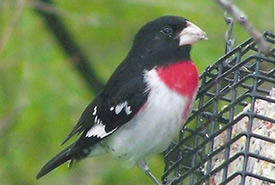Birds of the Happy Valley Forest (Part One)

Strikingly beautiful male rose-breasted grosbeak at the feeder eating suet. (Photo by Dr. Henry Barnett)
About 240 species of birds have been recorded over the past 60 years by my observation and that of my family occurring either within or over the Happy Valley Forest.
In the first centuries of European occupation of forested Canada there was a massive annual invasion of the beautiful passenger pigeon coming to nest. The last big flock to be described flew over Barrie, Ontario in the early 1900s. They were doomed to be extinct and the species gone forever from the Earth by September 1914.
Two things were proceeding in parallel: the extinction of the most abundant animal on Earth and simultaneously the huge loss of the seemingly limitless hardwood forest of eastern North America. You do not need to be a tree hugger to recognize that such indifference to natural things is no longer part of normal human thinking.
These observations are testimony to two facts:
First, it is apparent that over a period of nearly 70 years the Oak Ridges Moraine has been a treasure-house of permanent and transient avian populations. Second, it is encouraging that the Happy Valley Forest, the safe-guarding buttress of this unique work of nature taken over by the Nature Conservancy of Canada, is destined to remain its protector and host forever. This marvellously diverse area supporting a huge treasure-house of natural things is destined to be enjoyed by generations ahead.
We have witnessed substantial decline in many of the seed- and insect-eating inhabitants of the forest and its environs. We have observed some encouraging evidence of real recovery of some native species. Two examples are the trumpeter swan and the wild turkey. Both have nested in the Happy Valley Forest (wonderfully celebrating their return from local extinction!).
Habitat protection in all its ramifications (including reduction of herbicides and insect pesticides well below present levels) must be pursued. These restraints are key to maintaining what is left as well as what is threatened.
This is the fourth in a series of blog posts Dr. Barnett will be contributing to Land Lines in the next few months.


